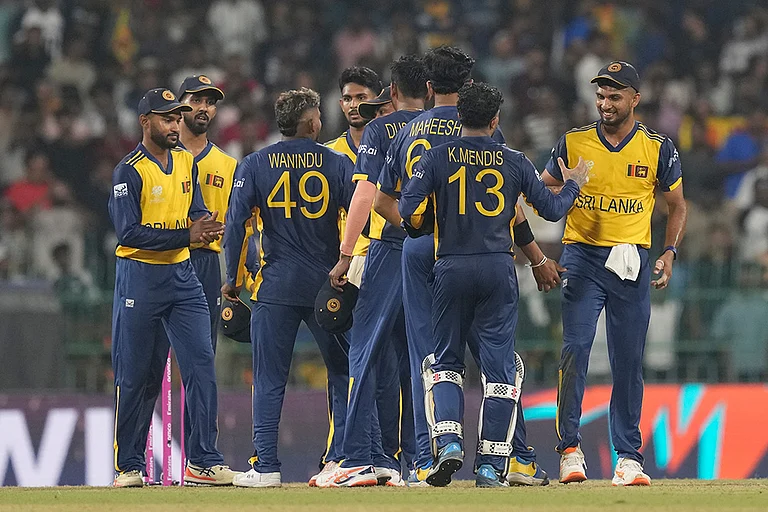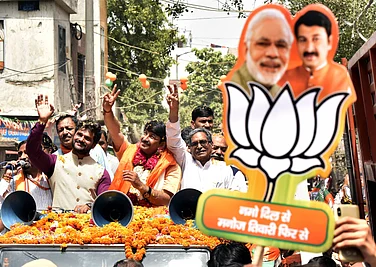The judges of the Supreme Court—the final court of appeal in India—usually adjudicate serious crimes at a distance from the place of occurrence. Busy with their heavy dockets and mostly confined in the sanitised environment that comes with the office, the seniormost judges rarely ever witness a crime themselves. On March 28, 2015, cable operator Jaswinder Singh ‘Jassi’ interrupted this routine—fatally—during a Telecom Disputes Settlement Appellate Tribunal (TDSAT) conference at a posh hotel in Amritsar.
The incident, in which Jassi consumed poison that led to his death, is said to have taken place in the presence of TDSAT chairperson and former Supreme Court judge Justice Aftab Alam, SC judge Justice Adarsh Kumar Goel, former chief justice of Rajasthan High Court and Lokpal of Punjab SK Mittal and Patna High Court acting chief justice Hemant Gupta.
In the footage (submitted by the TDSAT and private news channels), Jassi walks up to the dais and hands over some papers. The Amritsar district judge tries to pull him back, but the cable operator takes a step away, drinks something from a bottle he takes out of his pocket and exclaims, “I am going to die now.” A little later, he collapses and the police take him away. According to news reports published at the time, he died at a nearby private hospital two days later. Cause of death: poisoning.
As per reliable sources, at least one of the senior judges has tried to follow the case. However, it seems the probe into abetment of suicide stopped at an ‘untraced’ status report filed by the SIT a year ago. Outlook has reviewed court documents, the daily investigation diary, chargesheets, audio recordings made by Jassi, video footage of the suicide and other evidence that may have been left out from the SIT investigation into Jassi’s suicide. It turns out that Jassi was a prime witness in a CBI case in the 2003 Siti Cable sex scandal involving the very people he has blamed for his suicide. Amritsar city police commissioner G Nageswara Rao, a former CBI officer, however, tells Outlook that he is new to the post and busy with election duty, so is unaware of developments in this case.
According to a senior advocate present at the conference, the invitees were informed after Jassi’s act that he had alleged he was being harassed by the Amritsar operators of Fastway Cable, the largest cable TV multi-system operator (MSO) in Punjab, with an estimated market share of around 85 per cent in 2013 among the 40 lakh-odd TV viewers in the state. Fastway has been accused of employing operators who allegedly use unethical and strong-arm tactics against local cable operators.
Jassi had accused Fastway owner Gurdeep Singh of driving him to committing suicide. Two of its directors are reportedly on the boards of two media companies owned by deputy CM Sukhbir Badal. Badal’s media companies own the PTC channels that dominate space on Fastway. In 2010, regional news channel Day & Night had alleged that Fastway had booted them off their network because they reported news that showed the SAD-led government in a poor light.
SAD general secretary Maheshinder Singh Grewal, however, says, “The Akali Dal does not have even a remote connection with Fastway, though its owner may be a party sympathiser. If someone is delivered justice, that doesn’t mean the administration has favoured him. The courts and the media monitor everything and these are unfounded charges levelled by the Opposition because they have nothing else to counter us with.”
Jassi’s suicide note also accused SAD leader Pritpal Singh Lalli and Sarabjit Singh ‘Raju’, the main accused in the 2003 sex scandal and head of Fastway’s Amritsar operations. Raju has since been acquitted by the CBI court because the witnesses turned hostile. And as per the recording of the call Jassi’s wife Balbir Kaur made from the hospital to the police control room on the fateful day, she had also accused a fourth person, Gurwinder Singh Babbi. Gurdeep and Raju did not respond to Outlook’s calls.
Jassi had left behind a trail of evidence leading back to the 2003 CBI case and recordings of his phone calls suggested he was being harassed as a witness. A month after the incident, however, Balbir and her son Brahmjot Singh told a magistrate that Jassi’s business was doing well and the suicide was a stunt gone wrong. The court released the accused persons on bail. The SIT’s ‘untraced’ report last year means the accused were not cooperating or the police were unable to take them into custody. Balbir told Outlook that she did not wish to interact with the media.
In 2003, Punjab Human Rights Organisation (PHRO) chairman, Justice (retd) Ajit Singh Bains, filed a complaint alleging that Raju ran a sex racket using sex workers to curry favour with politicians and bureaucrats. The case was turned over to the CBI within a week. The CBI registered two FIRs and arrested Raju and 17 others. In July 2009, during the trial, Jassi and another witness complained of receiving threatening calls and, two months later, 15 witnesses, including Jassi, turned hostile. In August 2013, all the accused, including Raju, were acquitted in the sex racket case. Sarabjit Singh Verka of the PHRO suspects Jassi might have been bribed to turn against the prosecution.
In September 2014, Jassi said he wanted to revert to his earlier testimony, but committed suicide within six months. Following his suicide, the police did not record the statements of the judges or cable operators present at the conference. The FIR was lodged by Nishaan Singh, a police officer who was not present at the venue. According to the FIR, Jassi was clutching the suicide note when the police took him to the hospital, but it has been alleged that the note could be among the papers that the CCTV footage shows Jassi handing over to the judges on the dais.
In his suicide note, Jassi accused Fastway of “snatching away” his business and forcing him to commit suicide. Other operators, who had filed cases against Fastway alleging harassment, think that justice for Jassi would help them deal with the company’s intimidating tactics better. Pointing out that Jassi was a witness in the 2003 case and the main accused was the same, they demanded a CBI probe, which was turned down. Then, in August 2015, they approached the high court again, accusing the then SIT chief of bias and demanding a new SIT comprising police officers from outside Punjab. The court turned down the plea in August 2016 as that person had retired and a new team had been formed.
Legal experts believe that had the former and sitting judges been called to give their testimony, it would have perhaps led to the magistrate and the SIT taking the case more seriously. Justice Bains wrote to the judges who had witnessed Jassi’s suicide, pointing out that they had hurried to exit the premises instead of lodging a complaint, which would have placed the onus on them. Some of the judges responded that they would give their testimony, but the SIT is yet to approach them. Justice Alam did not respond to Outlook’s request for a comment.
The police did not submit the original suicide note to the government forensic lab, which has therefore withheld its report. The police consulted a private lab, which found the handwriting did not match Jassi’s, though the signature and the date do. PHRO had suggested that the SIT should call for handwriting samples of Jassi’s family members and see if the handwriting on the note matches with those. According to the note, Jassi was to end his life on March 28, 2015, in New Delhi. The TDSAT conference had earlier been scheduled for March 11 in the national capital and was later postponed to March 28 in Amritsar.
“Jassi had travelled to Delhi on March 11 with the other Amritsar-based cable operators,” says Verka. “One of them told me that Jassi’s wife had called, asking about her husband. That means he had planned to attempt a suicide bid, but since the event was postponed, they returned to Amritsar and he waited for another 17 days.”
Earlier, Jassi’s wife and son had narrated their woes since 2003 to several media houses. Balbir had also named the accused to the police, but later retracted her statement. After Jassi decided to revert to his original testimony in the 2003 case, he had written letters to the CBI and ministers in the Punjab government, indicating that Raju and the other accused would be responsible in case of his untimely death.
On Jassi’s smartphone there was reportedly a recording of a call from around that time, in which a senior police official of Ludhiana is heard summoning him for interrogation in a case. But there was no case against Jassi there. The SIT, however, attached Jassi’s CDR for only two days prior to his death. So this call recording is not among the evidence though it could have led to prosecution of the police officer after establishing the recording’s authenticity, according to legal experts.
While the appeal in the 2003 case is pending, high vourt could still transfer Jassi’s suicide probe to an independent body to address the long list of unanswered questions.
By Ushinor Majumdar in Amritsar and Chandigarh


























